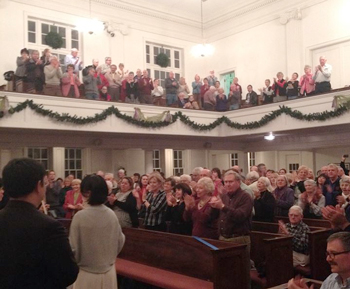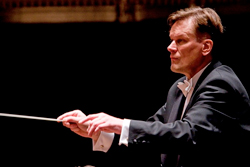by Nicholas Jones

Vivaldi’s violin concerto is full of word-painting about the chilling wind and the slippery streets of winter. Its ambitious program makes serious demands on the solo violin. Thirty-second notes (eight to a beat!) sweep through the concerto — brilliant scale passages evoking winter’s chilly winds, rapid stutters that sound like chattering teeth, and dropping arpeggios that mimic the pratfalls of hapless walkers on the icy streets. Miho Hashizume, CityMusic’s concertmaster and a member of The Cleveland Orchestra, gave a vibrant and masterful rendition of the perils and pleasures of the season.
Preceding Vivaldi’s “Winter” in the first half of the concert was Franz Josef Haydn’s Sinfonia Concertante in B flat major, essentially a concerto for four instruments featuring violinist Miho Hashizume, oboist Eric Ohlsson, cellist Sophie Benn, and bassoonist Laura Koepke. While Hashizume played the lead, all four soloists had substantial roles, with lots of duets and quartets and, near the end, some grand virtuosic licks for each. The piece itself is a lovely tour through late-18th century styles: the first movement is an example of mature Haydn orchestration, engaging and varied in texture; the second movement Andante is gracefully galante; and the finale thunders out in the declamatory style of the early-Romantic Sturm und Drang.
It was a particular pleasure to hear the bassoon and cello as soloists, more than holding their own with the violin and oboe. In Laura Koepke’s hands, the bassoon solos were especially notable for their clarity and sense of line. Sophie Benn’s expressive cello playing reminded me of the power of Haydn’s more well-known cello concertos.

An outlier in this concert of mostly 18th-century music came just after intermission and before the Mozart: an evocation of spring in Buenos Aires by Argentine composer Astor Piazzolla, known for his tango-infused music. Originally featuring the composer’s own instrument, the accordion-like bandoneón, this short piece was recast for solo violin (by Leonid Desyatnikov, for the violinist Gidon Kremer). Again, Hashizume took the solo part and evoked a variety of contrasting colors and tones from the jaunty to the lyrical and passionate.
The big piece of the second half was Mozart’s Symphony No. 41 in C, the “Jupiter.” This masterpiece, full of Mozart’s overflowing inventiveness, is well suited to the CityMusic chamber orchestra. The relatively small string sections played with vibrancy and were nicely balanced with the woodwinds. Brandy Hudelson, the single flutist, played with grace and sparkle, and pairs of trumpets and horns added force and color. Willich prepped the audience nicely before the Mozart by having the violins play the major themes of the complicated double fugue of the finale.
Unfortunately, CityMusic’s sound was too often unbalanced on Sunday. In the Vivaldi, the lovely Largo was nearly overwhelmed by too much volume in the violas and cellos, and in the Mozart, the brass and timpani were often too loud.
Lakewood Congregational Church was filled to overflowing for this free concert, and it was good to see a number of children and young people among the usual grey-haired crowd. Though the concert stretched to a full two hours — a bit much for a Sunday afternoon — the audience’s ovation at the end of the Mozart was as warm as the weather outside.
Published on ClevelandClassical.com December 21, 2015.
Click here for a printable copy of this article



